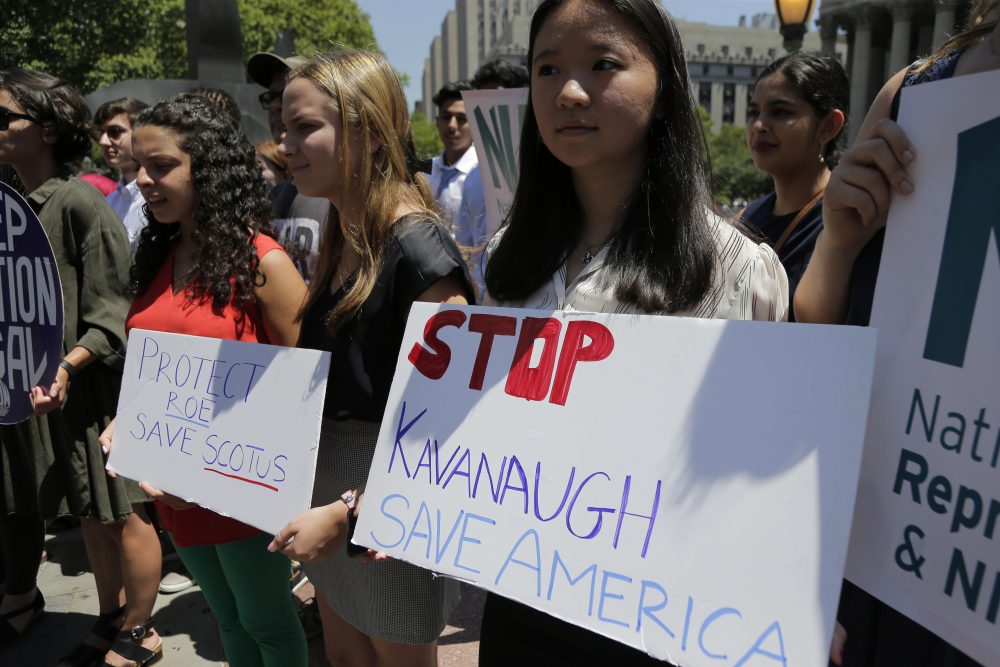By Guest Contributor: Sung Yeon Choimorrow (Executive Director, NAPAWF)
One year after the confirmation of Brett Kavanaugh to the Supreme Court, women of color, our families, and our communities are still under attack. This time last year, more than 100 women and people of color from all over the country traveled to Washington, DC to voice our strong opposition to Kavanaugh at the first-ever Reproductive Justice Day of Action. We showed our collective power in the halls of Congress to fight Kavanaugh’s nomination because we knew it would exacerbate the decades-long degradation of our rights and disregard for our lives, our families, and communities.
On that day, our message was clear – we were there not only to oppose Kavanaugh, but also to continue to fight for our agency to make decisions about our lives, our families, and our communities, free from oppression and violence, so that we and our communities can thrive. This is the heart of reproductive justice, a framework developed by black women in 1994 that views an individual’s life and reproductive decisions as shaped by various intersecting factors such as income, immigration status, access to care, racism, and more.
Kavanaugh’s confirmation was an attack on reproductive, immigrant, survivor, economic, disability, LGBTQ justice, and more. Although Kavanaugh was eventually confirmed to the Court, despite allegations of past sexual violence that continue to this day, people of color continue to fight back for our communities using the reproductive justice lens, and that fight continues to this day.
Justice Kavanaugh has demonstrated time and time again his hostility toward women, immigrants, and communities of color.
Justice Kavanaugh has demonstrated time and time again his hostility toward women, immigrants, and communities of color. While he was a federal appeals court judge, Kavanaugh attempted to block an unaccompanied immigrant teenager who was being detained by the government from accessing abortion in Azar v. Garza (sub. nom. Garza v. Hargan). Although the full Court of Appeals then reversed and ordered that the Jane Doe in that case be permitted to obtain the abortion without additional delay, Kavanaugh wrote a dissenting opinion, stating that the government’s policies and actions did not violate her constitutional rights and that Jane Doe, as an undocumented youth in custody, was not entitled to “abortion on demand.” Kavanaugh’s Garza dissent provided direct insight into his views on reproductive rights for women of color and immigrant women. Jane Doe had complied with all state laws related to minors who seek abortions without parental involvement; however, specifically because of her immigration status, Kavanaugh argued to deny her access.
While still new to the bench, Kavanaugh has already used his personal beliefs to reduce our rights during his tenure. After only seven months on the Court, Kavanaugh voted with the majority to uphold an Indiana law that adds to the long and unnecessary list of burdens that abortion providers must deal with to provide care to pregnant people. Kavanaugh’s attitude toward abortion access exacerbates the worrisome prospect for communities of color who already face increased barriers to access our reproductive health care.
Most recently, Justice Kavanaugh voted with the majority to permit the Trump administration’s new asylum rule to go into effect while the legal challenge against it continues. Under the new rule, most migrants are barred from seeking asylum if they have passed through another country before arriving in the US. This rule, even if later blocked, will do immense harm to communities of color seeking safety for ourselves and our families, and will directly affect our ability to make decisions about our lives, our families, and our communities. As such, this blatant attack on immigrants will have repercussions on our reproductive lives because it directly affects our health, our safety, and our ability to reunite with our families.
One year later, it is clear that the lives of women, immigrants, and communities of color are still threatened. While Kavanaugh now sits on our nation’s highest court, we continue to fight.
Kavanaugh’s role on the Court has the potential to cause even greater harm to communities of color and reproductive justice in the Court’s upcoming term. The Court is set to make major decisions regarding LGBTQ rights, in particular whether Title VII of the Civil Rights Act protects individuals who face employment discrimination on the basis of one’s sexual orientation or on the basis of being transgender. The Court is also set to address the Department of Homeland Security’s phasing out of the Deferred Action for Childhood Arrivals (DACA) program. These cases will determine vital issues that affect the wellbeing of LGBTQ and migrant communities. While we do not yet know what Kavanaugh will decide in these cases, he has thus far established his unwillingness to offer legal protections to LGBTQ and migrant communities.
One year later, it is clear that the lives of women, immigrants, and communities of color are still threatened. While Kavanaugh now sits on our nation’s highest court, we continue to fight. We have never stopped speaking out. We have never stopped shedding light on the reality that none of us live single issue lives. Our power continues to grow, and with it, we work tirelessly to oppose biased judges, stop and overturn harmful abortion restrictions, protect immigrants’ rights, advance economic justice, and work toward a society where all women and girls of color have agency to make decisions about our lives, families, and communities. Kavanaugh may still have his seat on the Court, but we will never stop, we will never fall silent, until we all can thrive.
Ms. Choimorrow is executive director of the National Asian Pacific American Women’s Forum.
Learn more about Reappropriate’s guest writing program and submit your work here.

